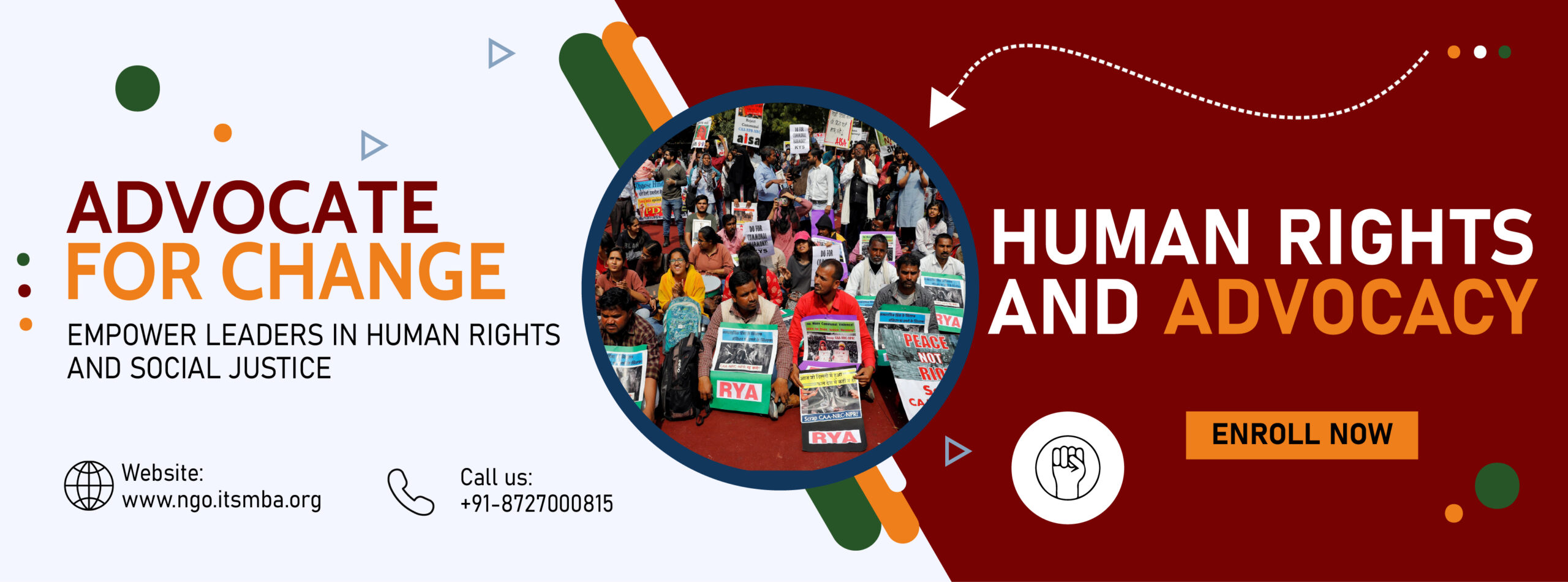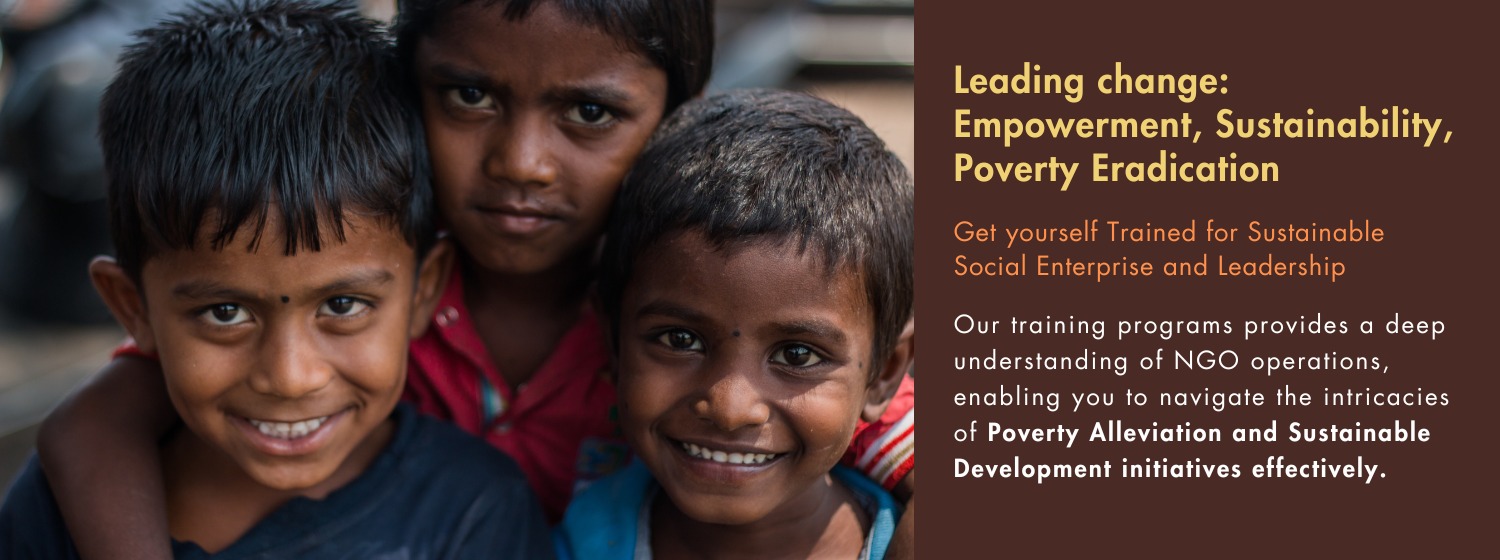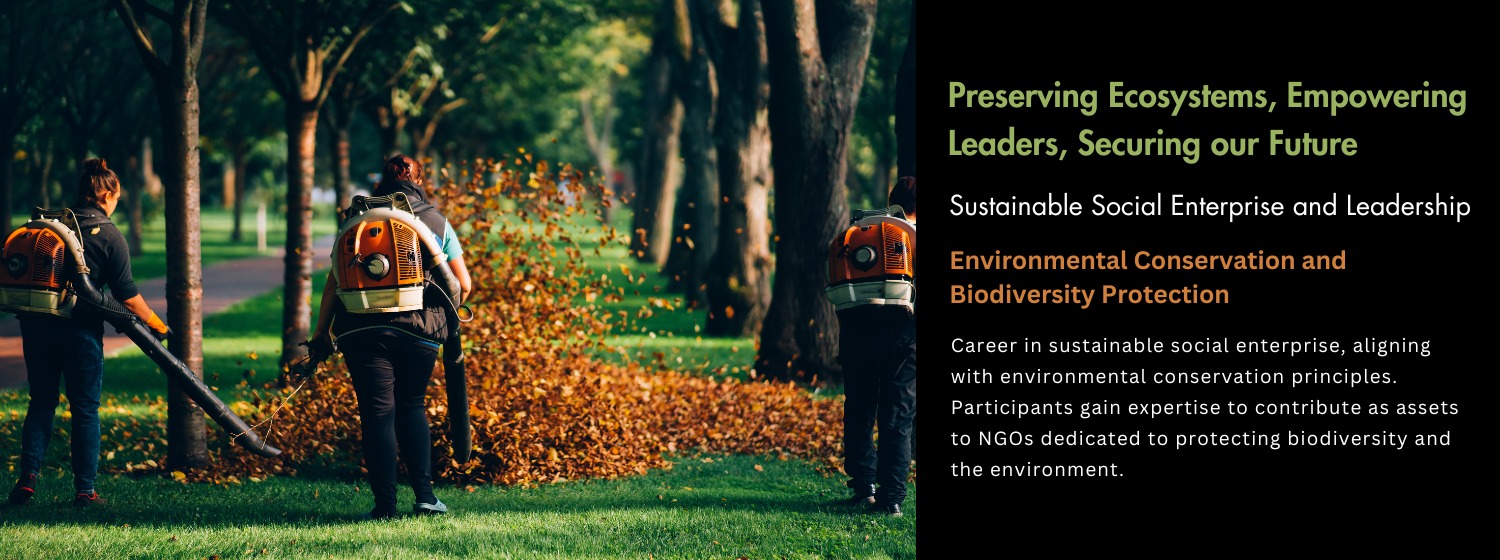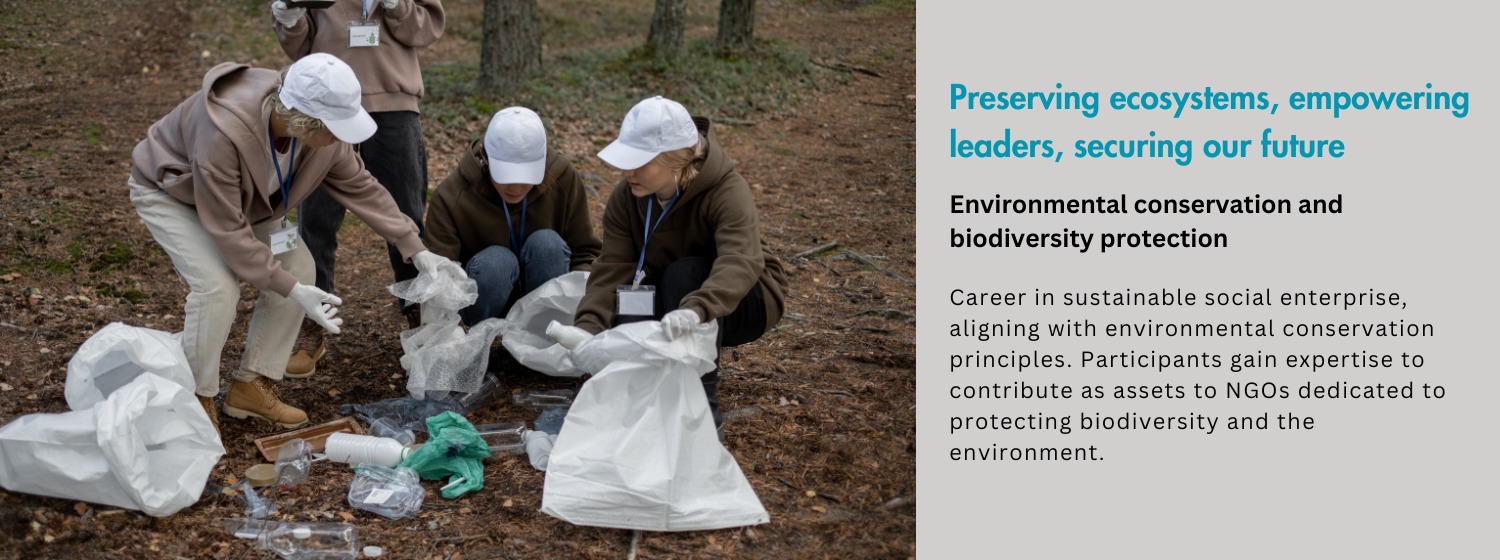









About Program
Step into a transformative journey of impact and empowerment with our two-year training Post Graduate Professional Certification program for Sustainable Social Enterprise and Leadership tailored for aspiring change-makers. This unparalleled initiative is meticulously crafted to ignite passion, nurture leadership, and equip individuals with the skills needed to champion positive change in the world. Our program isn’t just an educational endeavour; it’s an immersive experience that transcends conventional learning boundaries. Over the span of two enriching years, participants will embark on a profound exploration of NGO leadership, management, and the intricate dynamics of social impact.
We invite you to join a community of visionaries, where learning transcends the confines of textbooks and classrooms. Our curriculum blends knowledge acquisition with practical experiences, delving into the intricacies of NGO operations, fundraising strategies, program implementation, and the art of effective communication. With a balance between theory and real-world application, each quarter is designed to not only impart wisdom but to also foster hands-on experience through engaging projects and immersive internships. This program is a springboard for igniting the fire within you, empowering you to become a catalyst for change. Embrace this opportunity to carve your path towards a future where your actions resonate with purpose, and your endeavors contribute significantly to creating a better world for generations to come. Join us and embark on a remarkable journey that transcends boundaries, fuels inspiration, and cultivates leaders who dare to make a difference.
Program Purpose
The purpose of this comprehensive two-year training Post Graduate Professional Certification program for Sustainable Social Enterprise and Leadership is to cultivate a new generation of compassionate leaders and change-makers poised to tackle the complex challenges facing our world today. Rooted in the belief that meaningful transformation begins with education and practical experience, this program aims to equip individuals with the knowledge, skills, and hands-on expertise necessary to drive impactful change within non-governmental organizations (NGOs) and across diverse communities. Our purpose is multifaceted: to inspire and empower individuals who aspire to make a tangible difference in society, to instill a deep understanding of NGO operations and management, to nurture innovative thinking and problem-solving abilities, and to foster a global perspective essential for addressing local and global issues. By bridging theory and practice, our program aims to bridge the gap between academia and real-world challenges, offering a dynamic platform where participants can immerse themselves in the intricate landscape of social impact work. Ultimately, the program’s purpose is to create a cadre of leaders who are not just knowledgeable but also empathetic, strategic, and equipped with the practical tools to drive sustainable change. By providing a holistic educational experience that integrates theory, hands-on training, and exposure to real-life scenarios, our aim is to empower individuals to become catalysts for positive social transformation and to pave the way for a more equitable, sustainable, and compassionate future for our world.Program Objective
Program objectives aligned with the goals and purpose of the two-year training program focused on NGO leadership, management, and social impact:- Develop Comprehensive Understanding: Foster a deep comprehension of NGO operations, management principles, and the multifaceted dynamics of social impact work, equipping participants with a holistic understanding of the sector’s complexities.
- Enhance Practical Skills: Provide hands-on experience and practical skill development through immersive projects, internships, and real-life scenarios, empowering individuals to apply theoretical knowledge to real-world challenges effectively.
- Cultivate Leadership and Innovation: Nurture leadership qualities and encourage innovative thinking by fostering critical thinking, problem-solving abilities, and visionary leadership skills necessary for driving impactful change within NGOs and communities.
- Promote Ethical and Sustainable Practices:Instill ethical values, social responsibility, and a commitment to sustainable practices, guiding participants to champion ethical conduct, social justice, and environmental stewardship within their spheres of influence.
- Empower Effective Communication: Equip individuals with strong communication, advocacy, and storytelling skills to effectively engage stakeholders, articulate organizational goals, and advocate for social causes across diverse audiences.
- Foster Collaboration and Partnerships: Cultivate the ability to forge strategic collaborations, build partnerships, and work effectively in diverse teams, fostering a culture of collaboration essential for holistic social impact initiatives.
- Encourage Global Citizenship: Foster a global perspective and cultural competency, encouraging participants to understand and address local and global issues through inclusive and culturally sensitive approaches.
- Drive Impactful Change: Empower participants to design, implement, and evaluate impactful projects, initiatives, and campaigns that address societal challenges, contributing significantly to positive social change.
These objectives aim to guide and shape the learning journey of participants, ensuring they gain a comprehensive skill set, ethical values, and leadership qualities crucial for effecting meaningful change within the NGO sector and beyond.
Who Should Join This Program?
- Aspiring NGO Leaders: Individuals aiming to establish, lead, or work within the non-profit sector, seeking comprehensive knowledge and practical skills to drive impactful change.
- Career Changers: Professionals from diverse backgrounds considering a transition into the NGO sector, eager to gain specialized expertise and make a meaningful career shift.
- Retirees or Seasoned Professionals: Individuals retiring or seeking purposeful engagements after a successful career, looking to leverage their experience for social impact or philanthropic pursuits.
- Recent Graduates: Graduates passionate about social causes, seeking to build a robust foundation and practical experience before entering the NGO field.
- Entrepreneurs and Philanthropists: Individuals interested in social entrepreneurship, philanthropy, or launching initiatives addressing societal issues through non-profit ventures.
Prerequisites for Joining This Program
- Educational Background: While there may not be specific degree requirements, a basic educational background (high school diploma or equivalent) is often expected. Some programs may require a bachelor’s degree for enrollment.
- Relevant Experience or Interest: Candidates with prior experience in related fields, such as volunteering, internships, or professional work in social causes or community engagement, are often preferred.
- Commitment and Passion: A genuine interest in social impact, empathy towards societal issues, and a commitment to making a difference through non-profit work are essential.
- Language Proficiency: Depending on the program’s language of instruction, a minimum proficiency in the language (such as English proficiency for international programs) may be required.
- Financial Resources: Being able to afford the program fees or securing scholarships/grants, as well as having resources for accommodation (if applicable) and living expenses during the program’s duration.
- Tech Literacy: Basic computer literacy and access to necessary technological resources for online learning programs, if applicable.
- Visa or Travel Requirements: For international programs, meeting visa requirements or any necessary travel arrangements based on the program’s location.
These prerequisites ensure that candidates possess the foundational skills, mindset, and resources necessary to actively engage and benefit from the program’s offerings in NGO leadership, management, and social impact.
Program Promises
Program promises for participants enrolling in this two-year training program focused on NGO leadership, management, and social impact:- Tailored Learning Experience: Customize your educational journey with diverse elective options, allowing you to delve deeper into areas of specific interest within the NGO sector.
- Career Readiness: Acquire practical skills and industry-relevant knowledge that prepare you for immediate integration into the non-profit workforce or further academic pursuits.
- Professional Development: Gain access to workshops, seminars, and career development sessions aimed at honing essential professional skills, such as resume building, interview preparation, and networking strategies.
- Personal Growth and Leadership: Embrace a transformative journey that fosters personal growth, resilience, and the confidence to lead with integrity, empathy, and a profound sense of purpose.
- Real-world Exposure: Engage in field visits, live projects, and interactions with industry experts, offering first-hand exposure to diverse scenarios within the NGO landscape.
- Industry Connections: Access an extensive alumni network and ongoing professional development opportunities post-program completion, providing continued support and networking prospects.
- Global Perspective: Cultivate a broad worldview by engaging with global case studies, international perspectives, and cross-cultural experiences, preparing you to navigate diverse socio-cultural contexts.
- Empowerment through Technology: Harness the power of technology in social impact efforts through workshops on digital tools, data analytics, and technological innovations relevant to the NGO sector.
- Social Innovation Incubator: Explore and incubate innovative solutions to pressing societal issues through collaborative projects and mentorship from experts in the field of social innovation.
- Inspiring Community Engagement: Participate in community-driven initiatives and service projects, fostering a sense of social responsibility and empathy while making a tangible impact on local communities.
These promises aim to assure participants of a holistic, dynamic, and empowering learning experience, offering not just academic knowledge but also personal and professional growth opportunities essential for their journey towards becoming impactful leaders in the NGO sector.
Expected Outcomes
- Proficiency in NGO Management: Participants will gain a comprehensive understanding of NGO operations, financial management, strategic planning, and governance, enabling effective leadership within non-profit organizations.
- Applied Skills and Practical Experience: Acquire hands-on expertise through internships, projects, and simulations, translating theoretical knowledge into practical solutions for real-world challenges.
- Leadership and Innovation: Develop visionary leadership skills, critical thinking abilities, and innovative problem-solving approaches essential for driving sustainable and transformative change.
- Effective Communication and Advocacy: Hone strong communication, advocacy, and storytelling skills, enabling participants to effectively engage stakeholders, advocate for causes, and amplify social impact efforts.
- Ethical and Sustainable Practices: Embrace ethical values, social responsibility, and a commitment to sustainable practices, becoming advocates for ethical conduct and environmental stewardship.
- Impactful Projects and Initiatives: Design, implement, and evaluate impactful social projects, initiatives, or campaigns addressing critical societal issues, contributing significantly to positive social change.
- Global Citizenship and Collaboration: Cultivate a global mindset, cultural sensitivity, and collaborative skills necessary for addressing local and global challenges through inclusive and collaborative approaches.
Curriculum | Knowledge Aspect
These courses or subjects across the four semesters provide a comprehensive understanding of NGO leadership, management, operations, and various specialized areas essential for success in the non-profit sector. They cover a wide range of topics, from foundational principles to advanced strategies and skills required for effective NGO administration and operation.
Quarter 1 | Foundation Expedition
- Introduction to NGOs: History, Role, and Impact
- Fundamentals of Leadership and Management in NGOs
- Basics of Fundraising and Resource Mobilization
- Effective Communication Strategies for Social Organizations
Quarter 2 | Organizational Odyssey
- Governance and Ethics in NGOs
- Project Planning and Management in Social Organizations
- Financial Management in Non-profit Sector
- Community Engagement and Development
Quarter 3 | Impact Pathfinders
- Social Entrepreneurship and Innovation
- Advocacy, Policy Development, and Social Change
- Human Resource Management in NGOs
- Monitoring and Evaluation in Social Programs
Quarter 4 | Strategy Quest
- Legal Compliance and Regulatory Aspects in NGO Operations
- Marketing and Branding Strategies for NGOs
- Technology and Digital Tools for Social Impact
- Global Issues and Development Initiatives
Quarter 5 | Advanced Endeavors
- Advanced Program Management and Impact Assessment
- Financial Sustainability and Diversification for NGOs
- Cross-cultural Competence in NGO Operations
- Strategic Partnerships and Collaboration
Quarter 6 | Leadership Vistas
- Conflict Resolution and Peace building Strategies
- Leadership Development and Team Building in NGOs
- Data Analysis and Reporting for Non-profits
- Environmental Sustainability and Conservation
Quarter 7 | Advocacy Ascent
- Advanced Communication Strategies for NGOs
- Innovation in Development Projects
- Policy Analysis and Advocacy Techniques
- Philanthropy and Donor Relations
Quarter 8 | Strategic Manoeuvres
- Advanced Human Resource Strategies in Non-profits
- Advanced Financial Management and Audit Compliance
- Impact Investing and Social Finance
- Crisis Management and Risk Mitigation in NGOs
Curriculum Outline | Training Aspect
Aligning the training aspect and practical experience with the corresponding knowledge aspect is crucial for a well-rounded training program. Here’s a breakdown of the training courses or subjects mapped to the knowledge aspect across 8 quarters, 4 semesters, and two years:
Quarter 1 | Immersion in NGO Operations
- Shadowing and Practical Experience in NGO Leadership
- Volunteer Engagement and Field Work in Fundraising
- Communication Skills Workshop and Practical Application
- Community Engagement Project Implementation
Quarter 2 | Governance and Organizational Exposure
- Board Meeting Observation and Report Writing
- Project Management Simulation and Case Studies
- Financial Management Exercises and Budgeting Tasks
- Community Needs Assessment and Program Planning
Quarter 3 | Practical Social Impact Projects
- Social Entrepreneurship Project Development
- Advocacy Campaign Execution and Monitoring
- HR Role-Play and Recruitment Simulation
- Program Evaluation Fieldwork and Data Collection
Quarter 4 | Technology and Strategic Implementation
- Technology Integration in NGO Operations (Practical Work)
- Marketing Campaign Execution and Assessment
- Global Issues Research and Analysis
- Technology Tools for Project Management
Quarter 5 | Advance Project Management Practice
- Social Entrepreneurship Project Development
- Advocacy Campaign Execution and Monitoring
- HR Role-Play and Recruitment Simulation
- Program Evaluation Fieldwork and Data Collection
Quarter 6 | Leadership Development and Sustainability
- Technology Integration in NGO Operations (Practical Work)
- Marketing Campaign Execution and Assessment
- Global Issues Research and Analysis
- Technology Tools for Project Management
Quarter 7 | Advocacy and Communication Campaigns
- Advanced Communication Strategies Implementation
- Innovation Project Execution and Presentation
- Policy Advocacy Simulations and Case Studies
- Donor Relations and Fundraising Practicum
Quarter 8 | Strategic Management and Risk Mitigation
- Advanced HR Strategies and Role-Play
- Financial Management Case Studies and Audit Simulations
- Impact Investing Practical Analysis
- Crisis Management and Response Exercises
These unique names for each quarter’s training aspect are designed to align with and complement the corresponding knowledge aspect. The practical experience and training exercises are structured to reinforce and apply the concepts learned in the classroom, providing students with hands-on skills and experience in NGO leadership, management, and related areas.
